“We were locked in there for four days.”
Ryan Kehler
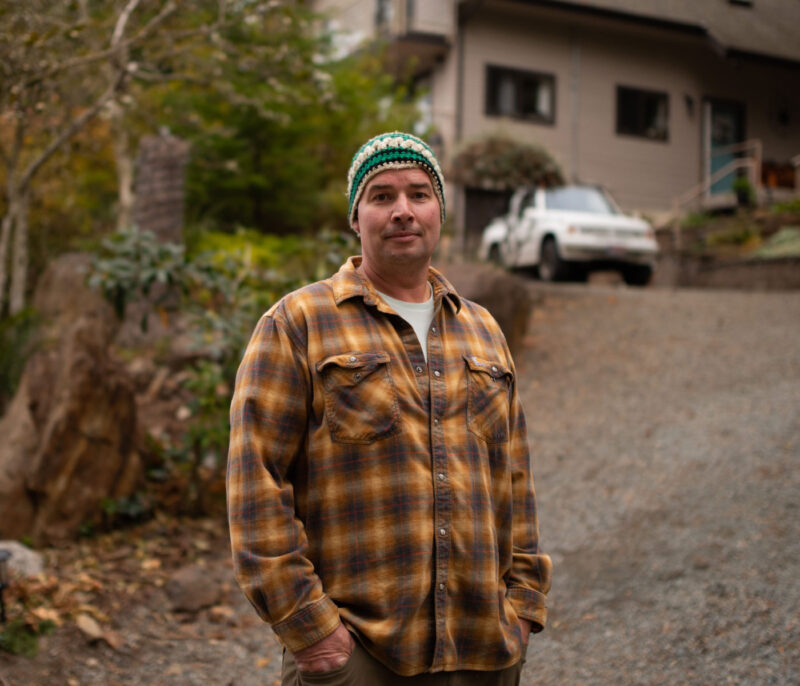
Ryan is a truck driver who picks up milk from the patchwork of dairy farms in the Fraser Valley, which is home to nearly 47,000 cows or half of British Columbia’s total herd. “You go from the little mom and pop places to the big boys that feed a big portion of the dairy industry,” he says. “I can legally carry 41,500 litres at a time, and I take it to one of approximately fifty plants in the Lower Mainland.”
But, when he’s not driving his truck, Ryan and his wife live in an A-frame just outside Harrison Hot Springs, a resort community made famous by its mineral baths. “It smells like a cabin, it looks like a cabin,” says Ryan, whose home has a vaulted ceiling, lots of wood, and is close to the shores of Harrison Lake. “I think we’re the fifth family to live here. Only the second people, full time.”
That rustic life suits Ryan, who spent a lot of time outdoors when he was growing up. It suits his wife too, who is half-Samoan, half-Norwegian, and owns a boho clothing business in nearby Abbotsford and Coquitlam. Together, the two of them camp, kayak, and take care of their dogs Winston, a French bulldog, and Makoa, a Heinz-57. They also enjoy cooking.
“That’s our idea of a good date, is to go to some ethnic grocery store, and go see what’s new or different. That’s probably one of our favourite things to do,” says Ryan. But, when the atmospheric rivers drenched Southern British Columbia, Ryan and his wife were enjoying a rare dinner out.
We were out with one of my sons, his girlfriend and her parents. It was sort of a meet and greet at a restaurant in Chilliwack. As we were coming home, it was raining really, really hard. It was nighttime, about 9:00 by that point. There was a police car blocking the road. We asked him what was going on, and he said there’s a little bit of a rock slide. They were clearing it, so maybe come back in an hour.
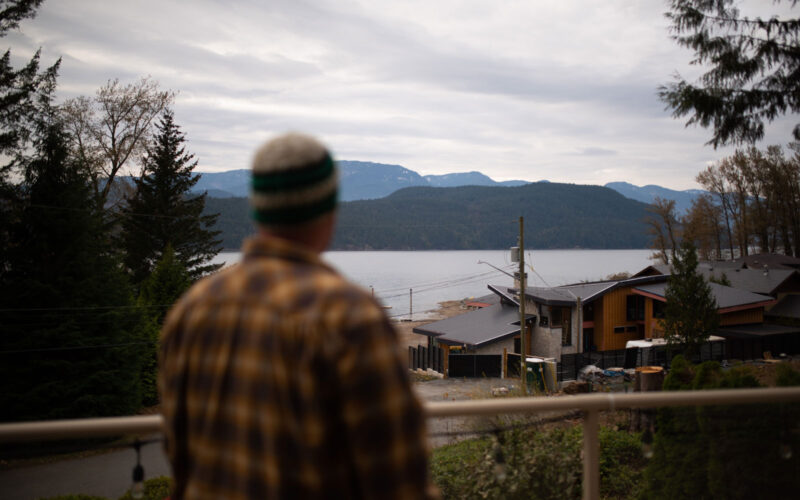
Milk truck driver Ryan Kehler was cut off from his home during the 2021 atmospheric rivers that flooded southern British Columbia. (CDP Photo/Phil McLachlan)
We drove around, hung out, and played on our phones. We came back and he told us the slide was bigger than they could handle. We were going to have to find somewhere else to stay that night. We’re not in clothes to be outside or anything. So, we went back into Harrison and got a hotel room.
Then we found out through Facebook how bad it really was. People were just trapped by these landslides. We were quite worried about our dogs. We got a hold of our neighbours and asked them to take the dogs out and let them go to the bathroom.
“People were just trapped by these landslides. We were quite worried about our dogs.”
The next morning is when the flooding started. It sounded like the whole world was coming to an end. The slides were a lot worse than anybody thought. So we just had to figure out a plan to get back to our house.
We found out two of our neighbours were trapped on the Harrison side as well. One was able to get a hold of his friend in town and made an agreement to boat us back to our house. So we sat by the public boat launch in our evening wear and waited for hours for him to show up, which he finally did.
By this point, it was still raining really hard. The wind came in.
We were able to get the boat in the water and took one of the scariest rides we ever had, trying not to capsize. I’ve been involved with boats my whole life, so I know when it’s bad to keep your mouth shut.
It wasn’t a power problem. It was just the waves were so big. It was probably a four to six foot chop.
I was trying to keep the window clear so the driver of the boat could see somewhat where he’s going. My wife and one of the neighbours were just trying to stay in their chairs. The third guy was trying to keep his balance. When we got to the community dock down from our house, the waves kept throwing the boat around. It took us half an hour to get everybody out.
One neighbour had to walk herself home. The water was still coming over the road. The way the rock and debris had come down, it created a pool. There’s a cliff on one side and a cliff on the other. We didn’t want her to go through, but she insisted. She waded through, fell down a couple times, and almost drowned. Looking back, probably should have tied a rope to her, life jackets, and everything.
There was so much water coming down all the hillsides. There’s a bridge behind us that washed out.
“There was so much water coming down all the hillsides. There’s a bridge behind us that washed out.”
We were locked in there for four days. There was cars parked all up our street because lots of people were trapped. You couldn’t even drive down the road. You had to use a quad.
There were three slides. The one closest to us was the smallest. At its deepest point, it was almost three feet deep. The next slide came down the side of a mountain, went right through one guy’s yard and proceeded across the road. It took out two properties towards the lake, just gutted everything. The third slide brought so much debris over the road and went through the guy’s property on the other side.
Search and rescue tried to evacuate us. They didn’t give us an evacuation order. They gave an evacuation notice. Every person said, “We’re not going anywhere because we’ve got everything we need. We have power. We have water.” You’re living out in the bush here. You’re pretty self-sufficient. There’s no point sitting in a hotel somewhere.
A neighbour started clearing the road themselves. It took some pretty heavy equipment to move, especially the big slide. He chipped away and chipped away. He couldn’t do nothing. It took them a week to clear our roads. All of a sudden it opens up. All the people got their cars out. The bridge took a while for them to fix. It’s still only a temporary bridge. We’re at the bottom of the list.
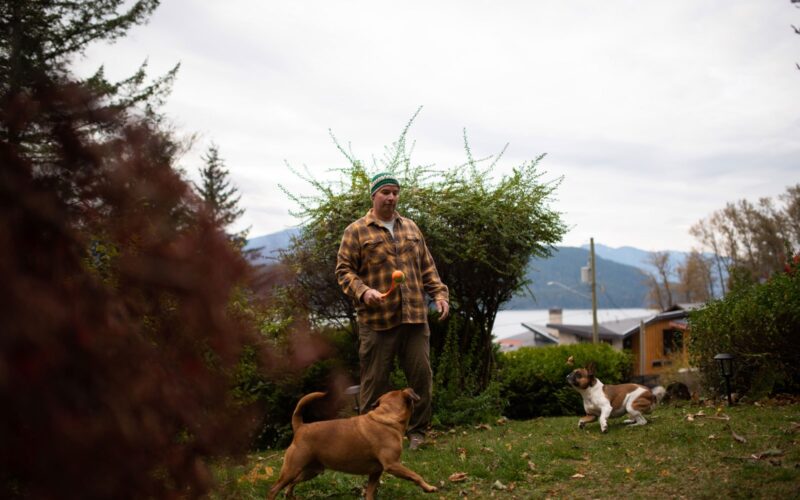
Ryan Kehler’s dogs were trapped on the other side of a landslide caused by the 2021 southern British Columbia floods. (CDP Photo/Phil McLachlan)
My wife, I think, has PTSD from it. She’s never been in a situation before where she hasn’t been allowed to come home. With the windstorms we had a couple weeks ago, she makes sure she’s home. She gets off work early. She gets all the candles out. She wants to make sure she’s not separated from the house.
“My wife, I think, has PTSD from it. She’s never been in a situation before where she hasn’t been allowed to come home.”
I remember growing up in the prairie, you’re always dealing with something like that. You’re always dealing with tornadoes. At a moment’s notice you could lose your roof. It’s in the back of my head that that could happen. Now that it actually has happened, you’re a little more prepared.
Everything now is ready to go. If something was to happen at the house, I could have my motorhome going in ten minutes. It’s full of gas. It’s full of propane. We’ve got ways of purifying water if we had to. My neighbours down the road, they’re fortifying. He probably had $100,000 of damage. It filled up his entire basement and wrecked half his house. He has got a barrier system now so the water doesn’t come near their basement.
They were forecasting twenty years ago that changes like this could happen, where you have more precipitation, heavier precipitation. I’m not a pessimist. I’m a believer in climate change. How do we tackle something this big? It’s a big question.
We have to stop burning fossil fuels. But if we don’t burn fossil fuels, what are we going to do? Are we going to go back 150 years, burn trees and live on coal-burning stoves? We would deforest the Lower Mainland in probably three days just to cook ourselves some meals and heat our house. We can’t go back to living in log cabins and teepees.
This story was originally published in The Fraser Valley Current on December 13, 2022.
Related Stories
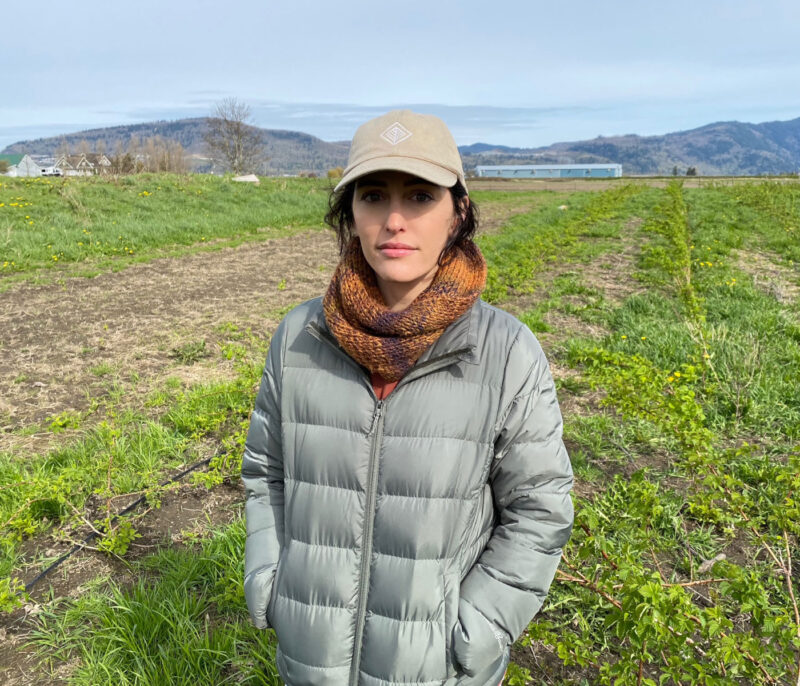
Shoshauna Routley, Abbotsford, Canada
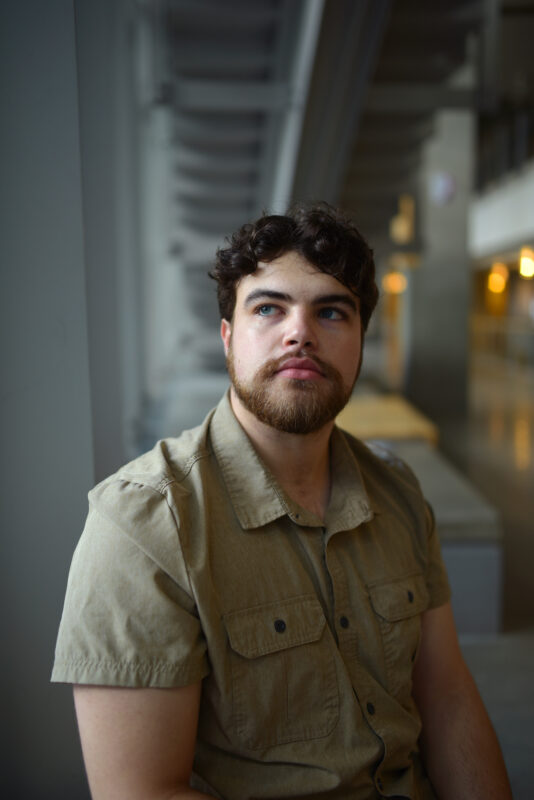
Gage Smith, Chilliwack, Canada
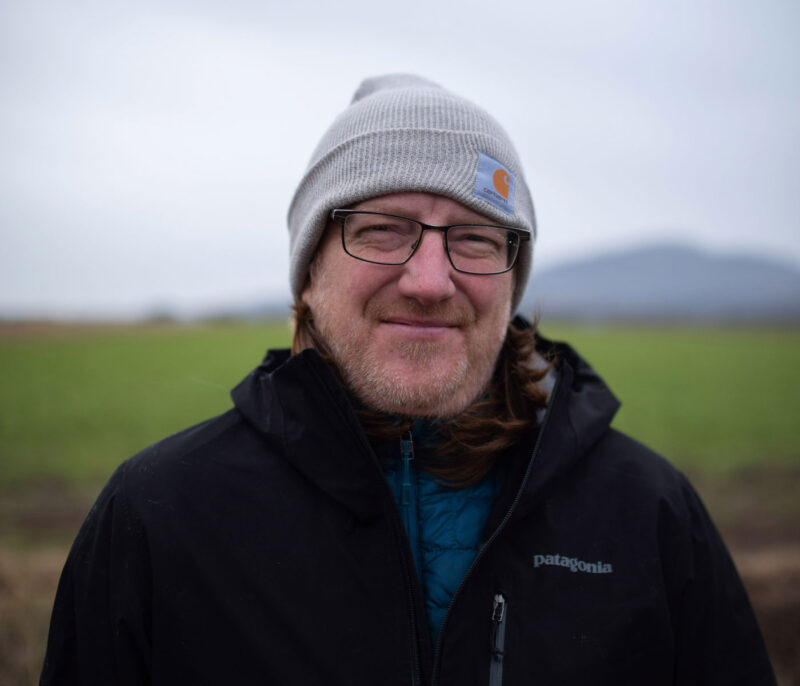
Jordi Williams, Chilliwack, Canada